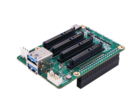Network-attached servers (NAS) are an obvious management solution for the often-vast amounts of data that large or growing businesses generate. How do employees get at this information to work on it, though? Virtual machines (VMs) are one popular answer.
They are a relatively straightforward pathway to a range of interfaces that any organization (or even residence-slash office, as the increasingly frequent case may be) might need. Furthermore, given the resources available to a comprehensive enough NAS, multiple VMs can be run with ease and in a cost-effective manner.
Accordingly, a given group with multiple devices can run a standard PC-like interface, file-station and media center off the same NAS - and implement a private virtual network between all of them at the same time without a significant additional outlay.
QNAP is a NAS manufacturer that has provided the vQTS system to create VMs on its servers since it introduced the Ryzen-based TS-x77 series in 2017. However, that was then, and the company has moved on to other processors and to the newer QuTSCloud creator.
It is compatible with VM interfaces such as Linux's KVM, VMware's ESXiNow, Microsoft's Hyper-V and QNAP's own Virtualization Station, as was its older counterpart. However, the company has announced that it is to formally supercede vQTS as the only official virtual solution on its NAS products.
This means that, while VMs based on the older system won't break down overnight, they will lose branded software support. In addition, QuTSCloud machines will be the only ones available to make from the latest versions of Virtualization Station (v3.4.6 and later).













